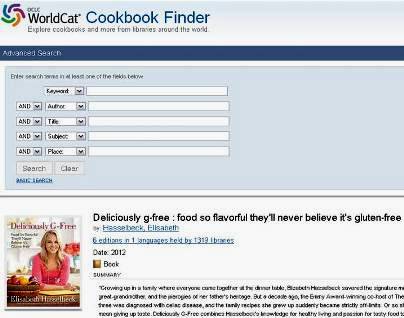Do you collect cookbooks? Are you looking for cookbooks with new recipes, perhaps using a certain ingredient? Well, the Cookbook Finder might be a real find for you!
This experimental application was developed by OCLC. OCLC provides us with WorldCat, which holds library catalog records from libraries all over the world. The Cookbook Finder lets you search library catalog records for cookbooks by authors, titles, ingredients or methods!
I had to try this out, even though I’m pretty much an anti-cook (ask anyone who knows me). But that pretty much makes searching by methods too much of a stretch for me.
I’ve read a lot lately about quinoa (What’s quinoa?) , so I searched for that and clicked on the first of the cookbooks retrieved: Deliciously g-free: Food so flavorful they’ll never believe it’s gluten-free. I scrolled down to the see a copy held at 939 libraries and clicked the title to find that there are copies at the public libraries in Whitewater, Fort Atkinson, Jefferson, Janesville, and others nearby! There also appears to be a link to Google Books, because I could click “Preview this item” under the image of the book’s cover and search within the book’s content (even though not all content can be viewed online).
Then I searched for tofu (What’s tofu?), since I recently watched an episode of the Jazzy Vegetarian on PBS and she seems to be a huge tofu fan, and selected one of the titles: Veganomicon: The ultimate vegan cookbook. I scrolled down and clicked the copy held at 867 libraries and this, too, is at Whitewater’s public library and other nearby libraries.
If you are interested in identifying cookbooks and possibly finding them in libraries near you, try this yourself! Or, if you want to see the cookbooks available in Andersen Library, search HALCat for cookbooks, and you’ll find titles like Weeknight wonders: Delicious healthy dishes in 30 minutes or less.
Enjoy.




 The
The 


 Wed., January 29 1-4pm
Wed., January 29 1-4pm

